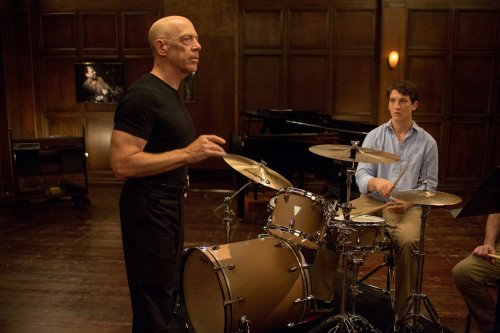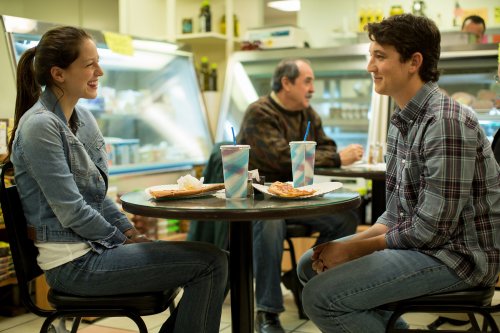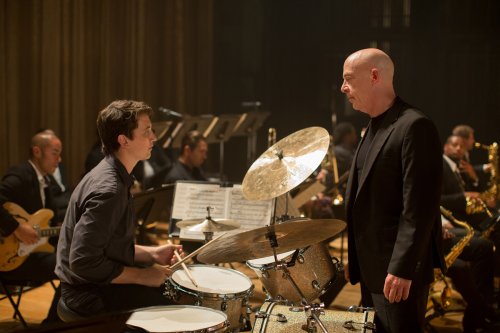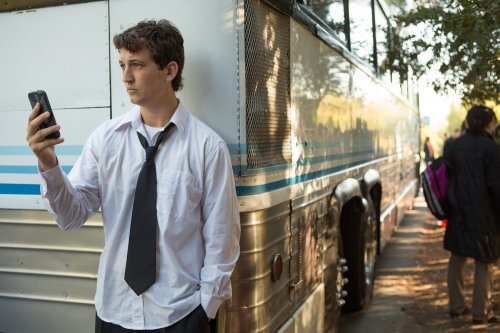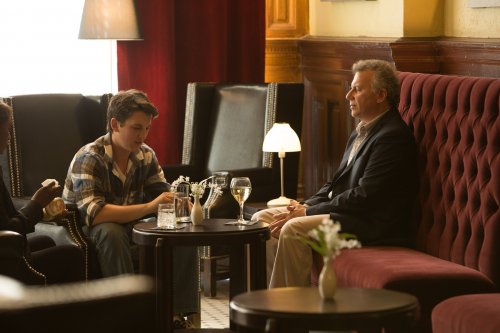Grzegorz Brzozowski: Whiplash suggests that jazz should mean blood, sweat and tears, rather than freedom and the joy of creation, things we would normally associate with that form of music. The playing of drums in Chazelle’s film is reminiscent of ballet in Aronofsky’s Black Swan. There is no room here for improvisation, no freedom of expression, only the laborious perfecting of one’s technique. Does Whiplash present an accurate portrayal of the jazz world, something which has not yet been captured by other filmmakers?
Michal Urbaniak: No, this film shouldn’t at all affect the way perceive jazz as such. And yet, the process of becoming a jazz player is in real life much as it appears in Whiplash. I have to honestly say that I cried numerous times while watching it, since it reminded me of my own childhood. Although my professor was not as cruel as the one on screen here, I was often thrown down the stairs by my own tutor – along with my music stand, violin and sheet music.
As a young man I had carte blanche when it came to exercises – I could not go to school, if I didn’t feel like it – on the condition that I would play my violin. This wasn’t as cruel as the portrayal in Whiplash, but since the age of six my mother told me: “Son, take your violin and show them”. That is why I was so moved and identified so deeply with the main character in the film. As a teenager, I even looked a little like him, when I played with Komeda – there are photos to prove it, even though I was a little more chubby.
Of course, the sorts of relationships we see in the movie do not and cannot happen in real life, however, slightly similar situations do arise. It is worth here recalling an anecdote about my encounters with Buddy Rich, the famous percussionist. Only once did I come into conflict with him, when we played Carnegie Hall, in 1974 or 1975. It was my last performance with the Polish group Fusion, along with Karolak, Bartkowski and Jarzębski. The Buddy Rich Big Band were on after us, it was a fabulous concert, and I was already looking for another person to join our ensemble. The Americans had a fantastic bassist, the seventeen-year-old Anthony Jackson, who approached me after the concert and said: “Here is my number. I like your music, if you want us to play together, I’m at your disposal”. I began attending Buddy Rich concerts, and arranged to meet up with Anthony, who then told Buddy about our plans. Then, one evening, Buddy says to me “So you are this fucking Polack who is stealing my bass player?!”
Which scene in the film made the biggest impression on you?
The one which sticks in my mind is the scene when our young hero picks up his sticks and says: “Fuck everybody, fuck it. I am great. I know what I’m doing”. He will do it regardless of whether he is thrown out or not, whether a thousand people are listening or none, he has the gift. I don’t know who really played that final improvisation, but whoever it was blew me away!
I was seduced by the spirit of competitiveness, that motto: it can be done. Anyone can walk out into the streets of New York, say: “I am a jazz player”, though no one knows who they are – go, show what you can do, play and really become a jazz player. Everything can be accomplished in the States, among the burning skyscrapers of Manhattan. Those final scenes are what this country is about – a place for people who want to “get something done” in life.
Whiplash shows a very specific form of musical education, which precedes the final bravura performance. How do you see it? Is it not a celebration of precision and craft as the absolute basis for good jazz?
Education means preparation for life and for work – but is jazz not more about passion? I am always saying that I am unemployed, that all I do is have fun and it really is true. Jazz is a game, which can be enjoyed through combining passion and work, but work which is far from mundane. One doesn’t have to be a professional in order to be a jazz player, because it’s not actually a profession. Those of us who choose such a way in life, a way which can often be very tough, are also rewarded through the experience of that amazing feeling: when things really are dark and depressing, jazz can help soothe the soul.
I have never been a tutor and I have neither talent nor inclination to become one, but I do have to fulfil a certain educational mission – as part of “Urbanator Days” – because I feel the need to do it. It is about showing students that one doesn’t have to read sheet music, doesn’t have to be all that disciplined, under the thumb or in fear of teachers. That which sounds like jazz doesn’t have to be jazz in actual fact. And here is the heart of the matter, something which is shown so well in Whiplash. All three percussionists played well, in theory – but the rub is, they didn’t. In virtuoso performances there are also elements which cannot be noted down, explained or be forced to happen. It’s like sex: either something clicks for real, or it doesn’t.
So an approach focused on technique – such as we see in Fletcher and his whole Manhattan conservatory – actually kills something fundamentally important for jazz?
Whiplash shows a very specific type of jazz – big band – which is currently rather unpopular, due to various factors, both sociologically and trend-wise. Certain traditions and schematics figure in it, aspects which have to be recreated. Without them, the phenomenon would not exist: the big band which plays as a single soul. This sort of jazz, however, demands more discipline than any other. In the days hen music used to be for dancing, in the ’30s and ’40s, things were different – that sort of ensemble would board a bus and play every day, from town to town, place to place, there was no time for practice and rehearsals. Duke Ellington or Count Basie would stick new compositions under their musicians’ noses, who would then take quick peeks and just play, as in tune as any four or five people are going to be if they play together every single day.
Schools, on the other hand, of course teach it “as it is written down”, especially in the case of the big band. Shaffer Conservatory is, by the way, a genius school of craft and theory, but in order to become a solo jazz player one has to have more imagination. Just as is the case with the hero of Whiplash, who in the end threw it all aside in and said: Now it’s me. That’s when nothing and no one matters. He loved it, lived for it, and that was why he would become the best. If he didn’t have such conviction, things would have been much worse for him. One has to aspire to something – although this doesn’t mean we’re involved in any kind of race. All we need here is the right sort of attitude: “I love jazz so much, perhaps I can be the next Charlie Parker”.
But does Whiplash, in its own way, not warn us against lofty ambitions that can lead to the destruction of a young, talented musician?
I didn’t see that in the film and wouldn’t perceive its message in this way. I think that life without creativity is not really lived. I spent twelve years practicing a dozen hours a day to develop myself as an artist.
The hero of Whiplash at a certain point surrenders all forms of social contact, in order to focus on perfecting his craft. Is this reasonable? What are the methods one can apply of finding balance between our passions and our regular lives?
I don’t know of any such methods, and paid dearly for this ignorance several times in life. As a fifteen-year-old, I already knew, living in a tiny room with little more than a record player and a saxophone, that I would not be able to marry, that the only relationships I was to have would be with female singers or agents. I imagined that the only stability I might experience would be around forty, which is indeed what happened.
If a sailor doesn’t fall in love with the sea, then it’s over for him – he will be lonely and lose his family. One must really love what one does in life. Ambition and the need to continually improve – this is something which applies to all manner of paths through life.
And so you would agree with Fletcher’s criticisms of American phrases such as “good job”? He says at a certain point that there is nothing more damaging to their culture than those very words – even though they aim to support and encourage, they actually stop people from falling foul of tendencies to be easily self-satisfied.
“Good job” – those words represent total failure to me. In America, they mean: “I have a job and pay my bills, I’m A-OK”. This film is a critique of such attitudes, because life lived that way really does become a slow death. Life does, of course, have many different aspects. We can sometimes expect some peace and rest, though this, in the case of a jazzman, can be tricky when it comes to women.
Having a cymbal thrown at him was supposedly the flashpoint which led to the development of Charlie Parker’s genius. You once mentioned that Miles Davis forbade Coltrane from pulling out a molar in order not to affect his sound, while he instructed another musician to regularly do 50 sit ups. In other words, cruelty among jazz tutors can be justified through the example of the greats: they simply want to create the next Charlie Parker.
I think this is going too far. Such relationships tend to come about with the agreement or through actual choice made by young, hothead musicians who want to play jazz. There are also those who go to lessons, study, have high expectations – and nothing comes of them. Fletcher was very set against this, didn’t want to teach such students, and yet he raised standards and forced them to make an effort. In jazz, we also need such lightness of touch, which is hard to find in a film made up of scenes showing artists working on their compositions, but then it was easy to hear during a concert: everyone was pleased, the music, as we say, smoked.
How can a young jazz player develop such lightness of touch, since they end up meeting Fletcher, who instantly demands from them professionalism and a perfectionist attitude to technique?
Andrew already has that seed in him, else he wouldn’t have ended up with that sort of teacher. He wants to improve and, with the help of an experienced jazz pro, reach a different level. Many musicians playing in bars and garages don’t know what to do with themselves, whether to study or not, though they often play better than those for whom no course of study can help.
One day, a friend phoned me up and said: “My son didn’t pass his entry exams into music school. I know you have contacts, could you help?”. I answered: “Of course, but I want to talk to him first”. I asked the lad: “What sort of music do you listen to?” – “Well, all sorts”. “Why do you want to study jazz?” – “Because it’s cool”. “What would you like to be?” – “I would like to be arrange music”. “And do you play the piano?” – “A little”. “And do you play any rhythm styles?” – “No, but I really like them”. “You know what? I could, of course, call a couple of friends and ask them to give you an audition, but I’m not going to do that. I will instead advise you to look for a different way in life, a different education. If you don’t heed my words, that means you really might belong in music, but in my opinion, you don’t”. I told him so, because there’s no point him becoming a frustrated, mediocre player surrounded by real artists. I thought – if he doesn’t listen to my advice and applies himself, maybe something will come of it. And in the end he didn’t go to music school, and I think he did the right thing – unfortunately, the truth is that schools need a certain number of students, in order to get funded.
Does Fletcher simply help his students nurture passions already present in them?
Yes. In a bad, egocentric and drastic way, he does a good job. The two main protagonists, who remain in constant conflict throughout the film, are in fact in agreement from the very start – each one striving towards his own ideal. The way in which the professor goes about it is absolutely unacceptable, but on the other hand understandable.
What then could Polish tutors learn from the film? What is specific about the style of education in Poland, compared with the one presented here?
I think they could definitely draw lessons from Whiplash in how to motivate pupils. A lecturer, in order to do well, must have ambition and be proud when they help create skilled artists. What is needed is simply for their teaching methods to be less invasive than those in the film. Fletcher’s method was very exaggerated, but in this way he managed to get through to everyone, even hard-headed, totally lazy students.
I myself was once thrown down the stairs – I studied under professor Szalewski, a famous violinist in a school in Lodz. Going to classes, we were all afraid. There were times when all sorts of things were thrown down the stairs from his classroom: music stand, papers, chairs, screams and then finally the student would come falling. I would then be next for his treatment. Professor Szalweski was a mad man, but then again he was an incredible chamber musician and talented artist. I was sort of a favourite of his, but there were a few times when I was sent flying down his stairs, not unlike Andrew in Whiplash.
And yet you also recall some of your professors as father figures – such as Andy relates to Fletcher in the film.
Indeed. I didn’t really have a father at that time: I had a stepfather, but my mother then divorced. My tutors would challenge my parents. Such relations can be destructive, but this depends only on the professor in question. After all, one could also have a bad father: there are families which have well or badly brought up children.
What then is the recipe for a great master, who both professionally and emotionally manages to nurture their students? Should they be stopped from paying the price which comes with the desire to achieve perfection, such as that paid by the hero of Whiplash, who comes close to nervous breakdown?
Above all, one should note and nurture individuality and allow it to burn, without imposing upon it one’s own personal habits. The whole lifelong learning experience can have positive and negative effects. Sometimes, along with incredible things – knowledge of your field, of your musical material – comes an extreme sort of personality, which should not be allowed to affect others. Pupils should have the most freedom possible, in order for the flower to flourish, for it to have access to sunlight which is not blocked by the shadow of another.
In Whiplash we are dealing with big bands, the jazz equivalent of a symphony orchestra. A solo violinist has a lot more freedom and can get away with much more. Let’s take the example of Nigel Kennedy, who is often accused of behaving excessively, but when he comes along and plays, there is no more doubt, no discussion. One day, Krzysztof Penderecki left a Kennedy concert early. It was a phenomenal performance, yet the young violinist dressed in a brocade blazer and stomped his feet during the more difficult passages. This is too much for some elements of the establishment.
What are the cardinal mistakes a great musical master should avoid making?
After the death of prof. Szalewski, some tried to change my technique. After I went to study under a different professor, I had to say goodbye to actual playing for a few months, seeing as I was tied up in changing my style, how I held my elbow and everything else. I think this was utterly ridiculous. Such things shouldn’t happen, unless it is essential and comes from the young musician’s own observations. What they must do is be themselves, not copy and clone something which has gone before.
Do you consider Whiplash to be accurate, compared to other jazz films?
I wouldn’t say that Whiplash belongs in a category of films about jazz. Music is here treated as one of the elements of a larger whole. If we are talking about films which are truly focused on jazz, then nothing beats Round Midnight with Dexter Gordon, that is top of my list. Bird, directed by Clint Eastwood, is also a very good film about Charlie Parker.
I would have to say I now count Whiplash among my favourite films of all time, regardless of theme. The way the film is constructed: rhythm, use of silence, the close-ups – in this context, Chazelle’s movie is one of the best I have ever seen. Another film which made a similar impression on me was One flew over a cuckoo’s nest – I love Nicholson to this day, anytime I see his photo, book, biography, I try to absorb it all. The second film I think is important for me is Amadeus. I have to admit, the first time I saw it I had to leave the cinema before the film ended – down to emotional health problems – I only managed to see the whole thing upon third viewing.
What sorts of phenomena from the world of jazz have not be given the film treatment yet?
What is hardest for people to understand is that what sounds like jazz is not jazz. Of course, the percussionists in Whiplash played the same notes with a similar sound, but something was missing. The note in jazz still has a singular value which is often sold to talented musical adepts. Apart from this, it has a certain length, a pitch, tension, shade and so on – it also has an aspect no one in musicology mentions. A single note can be worth the human life which produces it. Which is why, for example, Wayne Shorter – or many other mature geniuses – can go up on stage and play little, but the notes they deliver have such power, shivers shoot up and down my spine.
Of course, the most important message – something I dream about and aspire to – is that we will soon be dancing to jazz. I apologise to all experimenters: some variations without rhythm, without being rooted in actual jazz, were successful, interesting, but this has nothing to do with jazz for me. Sometimes, when a violinist comes to me and says: “I would like to learn how to improvise”, I think to myself: this cannot be taught. I then ask them: “Is there music which keeps going round and round your head? Try and play that which you enjoy, and when it comes to rhythm, when you are playing alone and feel like dancing, THAT will be jazz”. It’s simple: if you play solo and feel like moving around, that is jazz.






